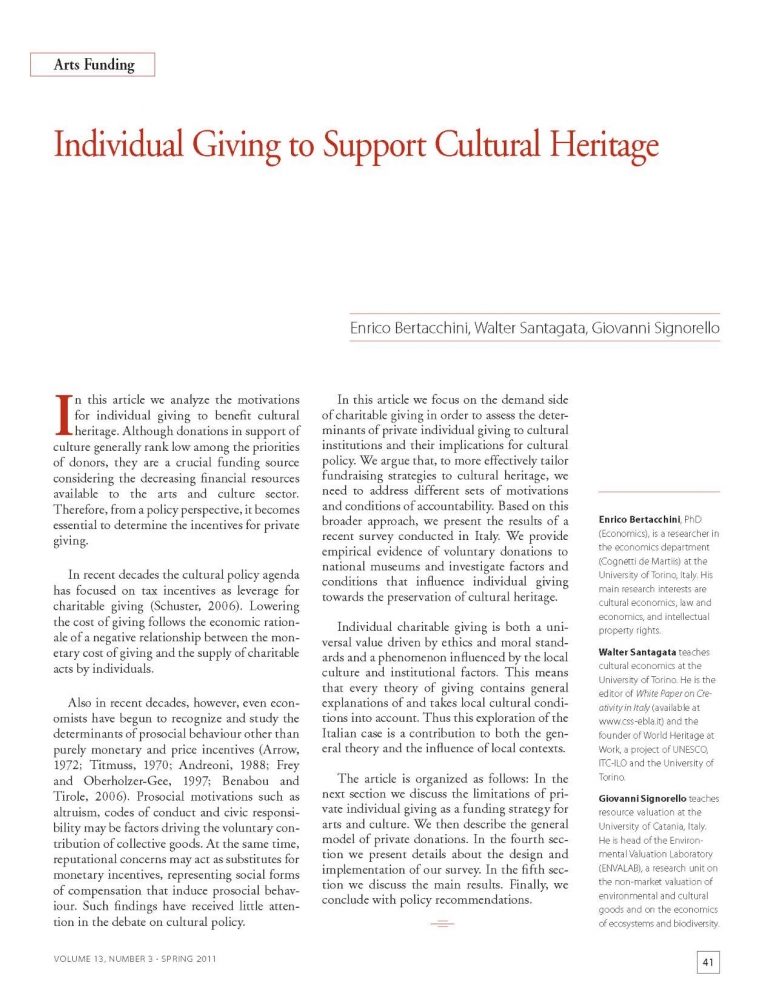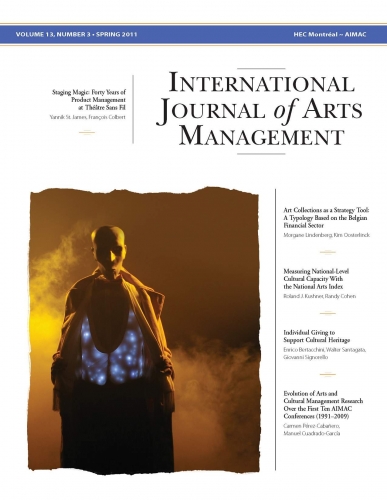Individual Giving to Support Cultural Heritage
Produit: Article
21,00 $ CA
Enrico Bertacchini, Walter Santagata, Giovanni Signorello
Enrico Bertacchini, PhD (Economics), is a researcher in the economics department (Cognetti de Martiis) at the University of Torino, Italy. His main research interests are cultural economics, law and economics, and intellectual property rights.
Walter Santagata teaches cultural economics at the University of Torino. He is the editor of White Paper on Creativity in Italy (available at www.css-ebla.it) and the founder of World Heritage at Work, a project of UNESCO, ITC-ILO and the University of Torino.
Giovanni Signorello teaches resource valuation at the University of Catania, Italy. He is head of the Environmental Valuation Laboratory (ENVALAB), a research unit on the non-market valuation of environmental and cultural goods and on the economics of ecosystems and biodiversity.
ABSTRACT
The authors analyze patterns of private individual giving to cultural heritage institutions in Italy. Based on the emerging economic literature on prosocial behaviour, they conducted a survey to assess individuals’ willingness to donate to museums and heritage institutions according to different conditions and sets of incentives. The findings reveal that the intrinsic motivations and accountability of the recipient institutions may be more effective drivers of charitable giving than the usual fiscal incentives. The results indicate avenues for future empirical research and suggestions for fundraising policies by cultural institutions.
KEYWORDS
Charitable giving, cultural heritage, prosocial behaviour
RÉSUMÉ
Les auteurs analysent les motivations sous-jacentes aux dons individuels à des institutions du patrimoine culturel en Italie. S’inspirant de la littérature économique émergente sur le comportement prosocial, ils effectuent un sondage pour évaluer la volonté des particuliers de faire des dons à des musées ou à des institutions patrimoniales selon certaines conditions et ensembles de mesures incitatives. Les résultats révèlent que les motivations intrinsèques et la responsabilité des institutions bénéficiaires peuvent être des moteurs plus efficaces de la bienfaisance que les incitatifs fiscaux habituels. Les auteurs indiquent des pistes pour la recherche future et proposent l’adoption de politiques de financement par les institutions culturelles.
MOTS CLÉS
Dons de bienfaisance, patrimoine culturel, comportement prosocial
RESUMEN
En este artículo se examinan las pautas de los donativos por parte de particulares a instituciones que forman parte del patrimonio cultural en Italia. Basándose en la literatura económica emergente sobre el comportamiento prosocial, los autores realizaron una encuesta para evaluar en función de las condiciones o incentivos ofrecidos la voluntad de las personas a donar a museos e instituciones patrimoniales. Los resultados revelan que más que los incentivos fiscales habituales, son las motivaciones intrínsecas y la responsabilidad de las instituciones beneficiarias las que impulsan más eficazmente los donativos. Los resultados indican también futuras líneas de investigación empírica y propuestas de políticas de recaudación de fondos por las instituciones culturales.
PALABRAS CLAVE
Donativos caritativos, patrimonio cultural, comportamiento prosocial

